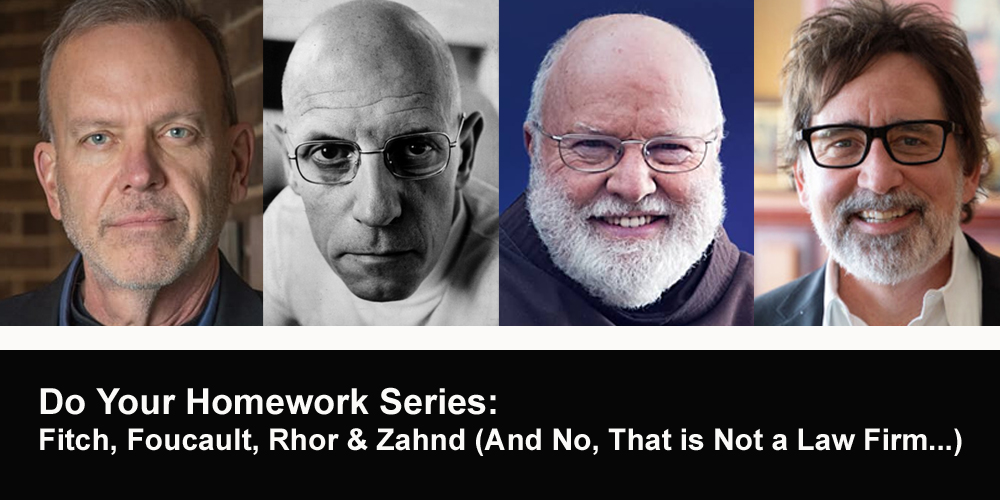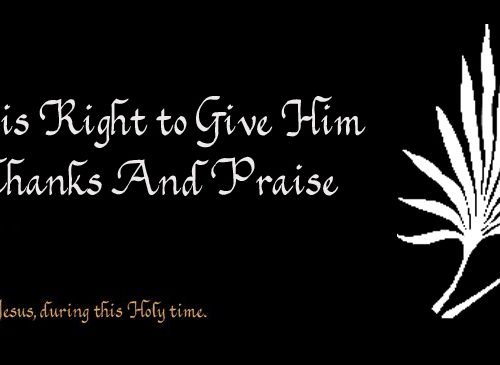This piece will be in several sections and includes some of my explorations this past week and what I’ve been learning. Basically, I’m going to link information and commentary for those who deeply care about remaining in the arena of sound, biblical doctrine and avoiding associations and “discipleship/conversionship” by modern-day heretics and those in the Church bent on promoting a variety of deconstructionist ideas (of both a soteriological and political nature).
I want to start by recommending the following talk Authenticity and the WOKE Crisis of the Real, by James Lindsay. And then, I will go on to make comments on parts of his talk as well as comments on the selected, spotlighted religious figures in my title (yes, Foucault should be considered a religious figure–any human that teaches others concerning morality, identity and worldview is essentially a “religious” figure even if they have no god).
Lindsay’s focus in the above-mentioned talk frames postmodernism as a crisis of authenticity.
He states, “Authenticity is WOKE kryptonite.” Then he goes on to say, “The WOKE don’t have any power over people who are authentic; WOKE-ism taps into people’s feelings of inauthenticity.”
I found his talk very engaging, especially the latter part where he speaks human-to-human on the topic of authenticity.
We Christians need to start doing our homework, rather than remain on the spiritually/intellectually lazy side. And those who teach others in the Church in a sanctioned capacity as biblical shepherds of flocks are scripturally called to a higher standard and are accountable, biblically, for that which they teach to those under their care. It is essential that all church leaders (pastors, elders, deacons, parachurch leaders, bible study leaders, seminary teachers, worship leaders, etc) exercise due diligence in mature discernment of the spiritual/intellectual influences they digest and then regurgitate to others.
So in this piece, I want to spotlight several theological figures I’ve come in contact with online this past week (or past month). Perhaps, I can do a series here of awareness-raising, as other figures are brought to my attention in various ways. It takes a lot to put these critiques together, so the idea for a “Do Your Homework” series may or may not progress as I might hope; honestly, I take in so much of this stuff daily/weekly I could write continually about what I’m hearing and witnessing at play in our nation and churches. But, alas, I cannot devote myself to this pursuit time-wise.
__________
My first highlight here as one may see in my title is of David Fitch. Below is one informational image that can be found if his name is searched, and you can read more of his thoughts on such social media as Twitter. He is a seminary professor, so I am curious about his leanings and the obvious influence/(ideological) power over others he has taught/is teaching.

While the secular WOKE draw upon Foucault (my spotlight on him will come next) and others, I find it curious that religious leaders such as David Fitch (and others) are also drinking at the well of Foucault.
The Christian-associated that are pushing a form of WOKE ideology are a bit more covert, yet some such as Fitch have the boldness to write a book (essentially on the redistribution of Church and political “power”) and to quote fourteen times from Michel Foucault.
Why would a Christian writer dare to draw upon quotations/ideology from a Marxist-leaning philosopher who is known as the “father of queer theory”? I will speak more in overview of Foucault as I continue below. As I understand it from Lindsay’s talk, current terms such as “minor attracted people” can be traced to and derived from the ideologic/moral/philosophical writings, thoughts and even purported practices of Foucault.
The answer to my question in the above paragraph may be as simple as he doesn’t think his listeners will do their homework on Foucault.

While we who follow Jesus and His words, as well as the teachings of the biblical authors/apostles who handed down the Christian faith that bears witness to Jesus Christ (in a manner/model that also teaches us to be on guard against immorality, destructive heresies and doctrines of demons) need to exercise compassion with grace and truth to those in our personal sphere who struggle with various sexual identity difficulties, for the purposes of critique of professing biblical teachers in the Church, we must also note that Foucault was not only Marxist but was a practicing homosexual. Below, there will be other information about his connection to pedophilia and sado-masochism. (I did not read any of these links in detail nor do I want to–but let the one who may be unconvinced of why it is wrong for a Christian influencer such as Fitch to share quotes by Foucault do their own homework and substantiate these things.
I will provide Google search images for the purpose of emphasizing the need for Christians to do their homework and to at least know what Foucault taught and practiced before they decide that whatever end they believe Fitch has in his book, Reckoning With Power, that somehow the “means” of aligning with Foucault in order to persuade/teach his readers some “concept” is morally acceptable.
It is neither biblical, nor is it morally acceptable.

No Christian pastor or seminary ideologue (of which Fitch is both) should be drawing upon and quoting people such as Foucault as though it has any bearing on following Jesus or discerning biblical mission (“telos” is the word Fitch and others in his similar ring of influence keep emphasizing).
For more on David Fitch and his recent book, see this piece BOOK REVIEW: “RECKONING WITH POWER” BY DAVID FITCH. After I put that review together, I later saw he had a YouTube interview surrounding his new book and his views on “power.” I find that watching how a person in leadership speaks in real time–their posture as it comes across in vocal tone and facial expressions–to be very valuable in aiding discernment.
I first listened to Fitch’s new book on Audible, and it was not read by himself but by a hired reader. I later got the Kindle version so I could locate specific written references through the search feature.

And now, some images of the top search results for the terms I put into Google, to give a sense of whom David Fitch, pastor and Christian seminary professor, appears to have respectful leanings toward:




In Lindsay’s talk Authenticity and the Woke Crisis of the Real (linked and recommended above at the beginning of this piece), I jotted a few notes during a part where he referred several times to “Derrida.” I did my homework and Googled the phonetic spelling of this name and immediately came up with Jacques Derrida whom I learned is considered the “father of deconstructionism.”

Lindsay describes Derrida’s “infinite deferral of meaning” in a way I found intriguing, since it names and resonates with a number of observations over the years of “conversational” deconstructionist maneuvers.
The first I ever came in contact with this methodology was in 2005 when a recent college graduate and I were in a discussion about a variety of things and I learned the phrase, “What does that even mean?” I actually adopted the phrase after that at times where it seemed to fit into dialogue, but only recently am I understanding its deconstructionist origin (with the implications that holds). It’s tough because sometimes it is appropriate to “dissect and analyze–possibly even deconstruct a thing” for some legitimate reason. Though now, I see where it all leads.
As for Lindsay’s comment about an infinite deferral of meaning (Jacques Derrida focused on language, the structure of language and how the structure of language conveys power and that words don’t mean anything or refer to anything real). I know that I have listened to and read various people (especially in the Church) that seem to be utilizing this technique of deferral of meaning (or the particulars) in their various biblical discourses–whether they are intending or by discipleship–they all speak in a somewhat similar manner.
I find this problematic because Communism Marries Truth to a Lie, and it can be hard to get to the unbiblical/a-biblical lies (the particulars) of teachings and discourses (“Conversations” is likely the term these proselytizing rings within the Church would say they are having among themselves, while they engage others in the deconstruction of sound biblical faith in Jesus).
Derrida believed that words exist in webs of meaning–words just refer to other words without any solid meaning. So many college students from the past twenty years (at least) have been trained/indoctrinated in this manner of conversational discourse. It is fairly easy for me to recognize a “WOKE” person by the way they hold a conversation with me–or to identify underlying WOKE/Marxist ideology in the Church (sermons, music, teachings, movements, etc.) through the linguistics employed.
About 20 minutes in, as Lindsay is commenting on Derrida, he makes a shift to talking about the implications of Derrida’s language concepts as they impact scripture-based religions and the discerning the meaning of scripture. I always appreciate Lindsay’s observations/insights/perspectives on how Marxist/deconstructionist ideology impacts true Christianity, given that he himself is an atheist. I’ve never yet heard him denigrate Christians or the faith, in fact, he makes keen observations (again as one outside of the Christian faith) and warnings against such infiltrations superimposed upon Christianity.
“Jacques Derrida (1930–2004) was the founder of “deconstruction,” a way of criticizing not only both literary and philosophical texts but also political institutions. Although Derrida at times expressed regret concerning the fate of the word “deconstruction,” its popularity indicates the wide-ranging influence of his thought, in philosophy, in literary criticism and theory, in art and, in particular, architectural theory, and in political theory.”
– Stanford Encyclopedia of Philosophy

I now move on to the false teachings of Richard Rohr after seeing a quotation of his shared this past week and refreshing my memory on why this Church influencer’s writings and beliefs are heretical. In conversation, it was mentioned that he didn’t hold to penal substitutionary atonement, but that didn’t make him a heretic. But when I think of Richard Rohr, my first basis of considering him heretical is in his pantheistic, gnostic understandings and especially, his aberrant understandings of the identity/divinity of Jesus. While he may in fact reject PSA, that would only logically follow from his offbase theological starting points. This article gives a good initial look at why Rohr, who is highly influential in progressive, social justice gospel circles, is not someone that circumspect Christian leaders should be referencing. A broken clock is correct twice a day, and if Rohr expresses a few theologically-sound thoughts, I am sure those same thoughts might be conveyed through similar quotations of others not considered heretical.
Moving on with doing our homework, the other night a recent Brian Zahnd sermon popped up in my YouTube feed and I decided to listen (he’s on my radar now, too) to get additional sense of his theological leanings. I like listening and building my discernment skills, and I worked in the kitchen with my hands during the entire message. Zahnd has written on the subject of the penal substitutionary theory of atonement, and while I really liked the creative title of his Lenten series “The Wood Between the Worlds” and he initially had some thought-provoking things to say, as he went on he revealed his atonement leanings (preferences that is…and I “think” he rejects PSA).
In the sermon he seems to be putting forth the recapitulation theory of atonement, and he also leads his listeners toward a kind of “utopian” view of God’s mission/accomplishment in the crucifixion, and makes a number of statements that lend themselves to depicting Jesus as more of a political revolutionary figure of sorts, again, with emphasis on how earth now is (or can become, through the crucifixion of Jesus), which to my ears seemed to draw upon emphasis on a couple of other theories of atonement and omitting/minimizing the PSA. I think there is basis for all these theories of atonement to some degree, biblically, in that they all work together. But the penal substitutionary theory of atonement which most evangelicals hold as of primary importance, is currently under such attack by progressives/social-justice gospel preachers in the Church for a number of likely reasons of political agenda.
I think this sermon could stand for a lot of deeper analysis, but I will leave the reader to do their homework by listening with biblical discernment.
Thank You For Reading
Please Feel Free To Express Your Thoughts Below





100 фунт салмақты көрпе
April 26, 2024If you would like to improve your know-how just keep visiting this web page and be updated
with the most up-to-date news posted here.
пернетақтада минутына таңбалардың орташа теру жылдамдығы
April 26, 2024I’ve been surfing on-line greater than 3 hours as of late, but I
by no means discovered any interesting article like yours.
It’s beautiful value sufficient for me. In my view,
if all webmasters and bloggers made good content as you did, the internet can be much more helpful than ever before.
Ресейліктерге Араб Әмірліктеріне виза қажет пе?
April 26, 2024Hi there, I want to subscribe for this blog to get
latest updates, so where can i do it please
help out.
Жаңадан бастаушыларға арналған криптовалюталар және блокчейн - толық нұсқаулық
April 26, 2024Hmm it appears like your blog ate my first comment (it was super long) so I
guess I’ll just sum it up what I submitted and say, I’m thoroughly enjoying your blog.
I as well am an aspiring blog blogger but I’m still new to everything.
Do you have any tips for first-time blog writers?
I’d certainly appreciate it.
Ең жақсы француз тілі оқулығы. жаңадан бастаушыларға арналған толық курс
April 27, 2024Terrific post however , I was wondering if you could write a litte more on this subject?
I’d be very grateful if you could elaborate a little bit further.
Thanks!
Qiwi әмияны бақылауға бола ма?
April 27, 2024Article writing is also a excitement, if you be acquainted with then you can write otherwise it
is complex to write.
150 канадалық доллар үшін Гана седисіне
April 27, 2024I used to be recommended this blog through my cousin. I am now not
certain whether or not this post is written by means of him as no one else know such
certain approximately my difficulty. You’re wonderful!
Thank you!
Биткоиннан Найра бағамы қара нарық
April 27, 2024When someone writes an piece of writing he/she keeps the thought of a user in his/her brain that how a user can be
aware of it. Thus that’s why this post is great.
Thanks!
bet TV қолданбасы
April 27, 2024I will immediately clutch your rss as I can’t to find your email subscription hyperlink or newsletter service.
Do you’ve any? Kindly allow me understand so that I could subscribe.
Thanks.
Қазақстаннан Түркияға ақша аударуға болады ма?
April 27, 2024If some one wishes expert view about running a blog afterward i suggest him/her to visit this blog, Keep up the
nice work.
биткоин және xrp бірдей IP мекенжайы
April 28, 2024Very quickly this website will be famous among all blogging and site-building viewers,
due to it’s fastidious content